GoPeer is an online tutoring platform that connects K-12 students to vetted college tutors (often from Ivy League schools) for live 1:1 lessons. It operates mainly in the US (headquartered in Providence, Rhode Island) and serves grades K-12. This article compares GoPeer’s features, pricing and user feedback so parents and students can make an informed choice.
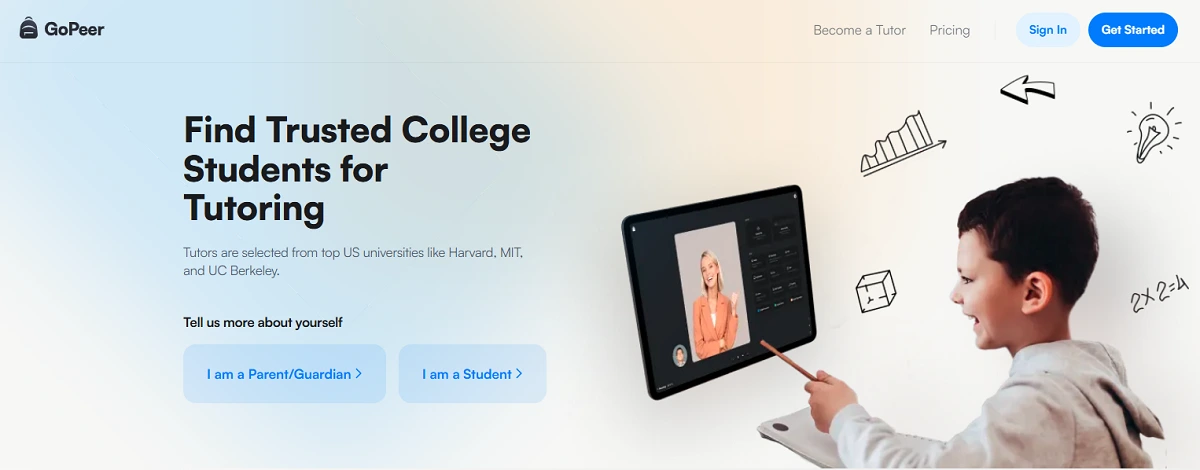
GoPeer Reviews and Testimonials
BBB Reviews (Better Business Bureau): GoPeer has only 2 customer reviews on BBB with an average rating of 1/5. Both reviews are negative. One parent complained that GoPeer kept charging the yearly membership fee ($288) even after cancellation attempts. A tutor posted a 1-star review saying customer service was rude when she tried to end a lesson. These BBB reviews highlight issues with billing and support, but note that BBB requires no accreditation.
Indeed (Tutor Reviews): On Indeed, GoPeer has 11 tutor reviews averaging 3.9/5 stars. Many tutors praise the flexibility and ease of work. For example, a tutor said the pay is better than many other side jobs and that GoPeer management was “nice and supportive”. Tutors also note they always receive their $20/hr payment on time. However, common complaints are that GoPeer has too few students. Tutors say it can take months to build up a client base. Several mention the user interface can be “a bit wonky” and students are often flaky about booking sessions. In short, tutors like the work–life balance and respect but dislike inconsistent lesson volume and low pay.
Knoji (Review Aggregator): Knoji reports that GoPeer has 36 user reviews and an overall score of 4.0/5. It ranks GoPeer as a mid-range brand among online tutoring services. On Knoji, GoPeer scores well on having features like 1:1 video lessons, college tutors, and satisfaction guarantee. But Knoji’s text notes an average shopper rating of only 2.8/5:contentReference[oaicite:18]{index=18}, suggesting mixed feedback. Knoji highlights that GoPeer offers a simple tutoring platform but doesn’t heavily discount or have many special deals. The takeaway from Knoji is that shoppers find GoPeer solid but not outstanding; it’s seen as effective for learning but not particularly unique.
GoPeer Website (Own Testimonials): On GoPeer’s Pricing page, there are parent testimonials (with names and photos) praising tutor quality. For example, a parent said GoPeer “matched her daughter with a great tutor” who boosted her confidence. Another says the tutors “explain concepts clearly” and were “patient”. The site also advertises a “100% Satisfaction Guarantee”, though this appears more as a marketing promise than a practical refund plan (see below). Overall, the site’s own testimonials emphasize satisfied students and affordable pricing, but these are controlled quotes and should be taken with caution.
Is GoPeer legit? Yes. GoPeer appears to be a genuine, functioning business. It is headquartered in the USA and has an A+ BBB rating. It has received press coverage (e.g. Business Insider) and seed funding. Despite a couple of negative reviews, there is no indication GoPeer is a scam. Its track record (over 16,000 K-12 students served by 2020) and its visibility (founders on Forbes 30 Under 30 list) confirm it is an established tutoring platform.
GoPeer Pricing
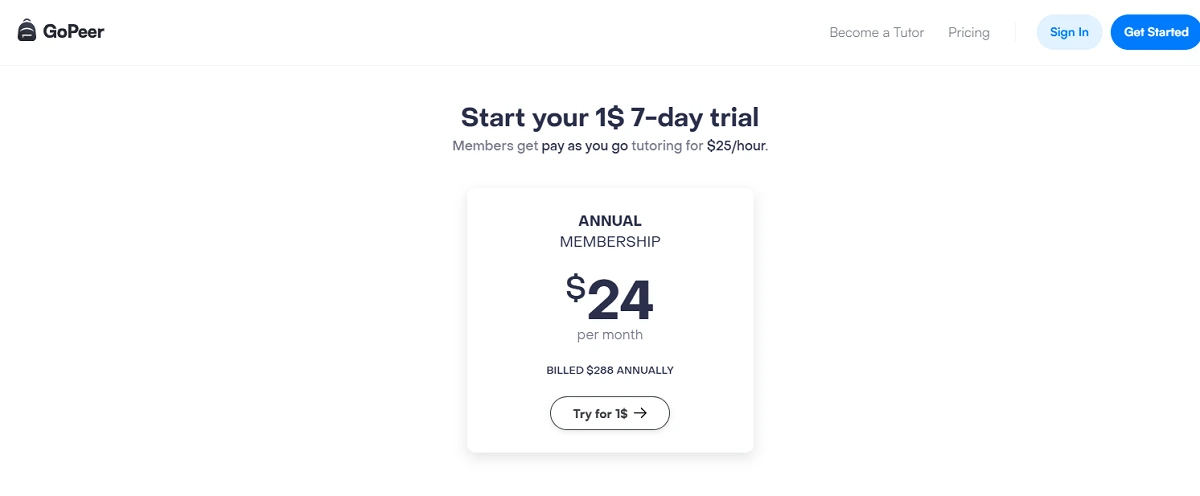
Pricing Range
GoPeer’s pricing is straightforward: lessons cost $25 USD per hour (so $12.50 for a half-hour). They offer a low-cost membership: $24 per month ($288 billed yearly). Members get unlimited $25/hour sessions. There is also a $1 trial period for 7 days. In other words, the base rate is flat ($25/hr) regardless of subject or tutor. Historically GoPeer advertised $20/hr, making it about one-third of the national average rate for tutors. That makes GoPeer very competitive. Students usually pay per session, so there’s no commission or markup on tutors (GoPeer says tutors keep 100% of what students pay). No separate pricing is listed for different services – GoPeer mainly offers live tutoring and does not break out homework-help or test prep as separate packages. (Though in pandemic initiatives it has run special free or discounted programs.) The key point: top-quality tutors cost $25/hour on GoPeer. If you compare, many private tutors charge $50–$100+ per hour elsewhere, so this is on the low side. As one user wrote, GoPeer’s price is 1/3 of the U.S. average. In summary: GoPeer’s pricing is flat-rate and very affordable. Check their official pricing page for details.
What students say about GoPeer Pricing
Feedback from students suggests they find the pricing quite fair. At $25/hr with a membership, GoPeer is much cheaper than many tutors on the market (some charge $60/hr or more). We did not find any student reviews complaining that GoPeer is overpriced. In fact, industry analysis notes GoPeer’s rate is well below average for private tutoring. Some parents value the flat pricing and optional membership (which locks in the rate) as good value. One parent, however, warned on BBB that the annual membership fee caught them by surprise. Overall, most users seem to feel GoPeer’s prices are reasonable given the quality. Compared to an average US rate of ~$60/hr, GoPeer’s fee is low, so most reviewers view it as justified.
Hidden costs
GoPeer advertises no hidden fees beyond tuition and membership. There is no sign-up or registration fee on top of the hourly rates and membership. The site makes one-time charges clear – e.g. you pay $1 to start, then either pay-as-you-go $25/hr, or subscribe monthly. However, one customer review warns of a hidden issue: GoPeer’s annual membership renews automatically, and their card was charged again despite attempts to cancel. That suggests the only “hidden cost” may be an auto-renewal if you forget to cancel. Otherwise, there are no extra add-ons listed. The cancellation policy says lessons canceled <12 hours before will still charge 100% of the lesson, which is standard for tutoring. No other fees (e.g. for materials or special requests) are documented. In short, aside from paying attention to the subscription renewal, students should not face unexpected charges.
How GoPeer’s pricing works
GoPeer uses simple online payment. Payments go through Stripe (a secure gateway). Students either pre-pay via membership (billed monthly/annually) or add funds to pay per session. GoPeer does not appear to require payment in advance for each lesson – you can be billed after a session. They do not list any group discounts, special category discounts (military, etc.), or loyalty program. The company’s promotions are limited to the low trial price or occasional free programs (like COVID relief sessions). There are no monthly subscription packages beyond the flat membership and trial. We found no promo codes advertised on GoPeer’s site. In summary, you pay via credit card through their site/app when sessions occur, and choose either a trial, pay-as-you-go, or membership plan with no frills beyond that.
Free Trial
Yes. GoPeer offers a $1 trial that lasts 7 days. During this trial, you can try out tutoring at the usual $25/hr rate. To use it, you enter your email and a referral code (if you have one) when signing up. After the trial, you can choose to continue with pay-as-you-go or sign up for the annual plan. Details are on GoPeer’s Pricing page. Note: some third-party sites or Reddit posts mention referral codes to extend trial time, but for most users the official trial is 7 days/$1.
Refund policy
GoPeer’s published policy is strict: membership fees (monthly or annual) are non-refundable. According to the Help Center, if you cancel a plan, you won’t get any money back for unused time. There is no pro-rata or partial refund. On their Pricing FAQ, GoPeer claims a “100% Satisfaction Guarantee”, but this seems more like a marketing promise; the actual terms say no refunds after purchase. We found no clauses about refunds for single lessons. In practice, if you pre-pay for a lesson, it counts even if you’re unhappy, so the guarantee may not be honored. Several online comments note frustration: one BBB user said her refund requests were ignored. In summary, don’t expect GoPeer to refund tuition once paid. This contrasts with GoPeer’s advertising, so it’s wise to use the trial period fully to make sure you’re satisfied before paying.
GoPeer Alternatives
Some families may look for options besides GoPeer. Reasons include wanting different pricing, subject expertise, or service features. Below is a list of popular tutoring platforms that compete with GoPeer. Note our own site My Engineering Buddy is included naturally as one alternative. These platforms cover overlapping subjects and may have different strengths.
Wyzant
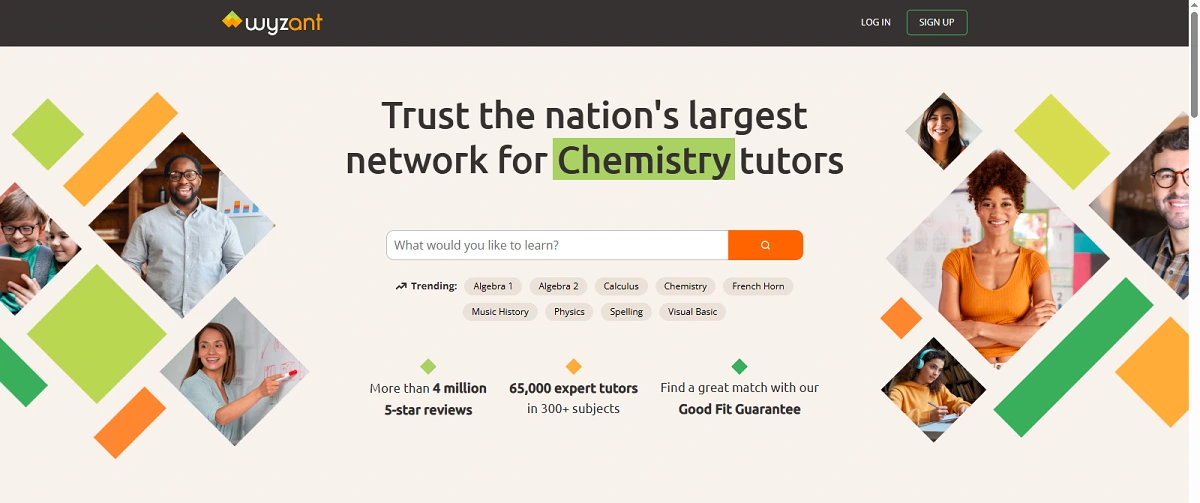
Pros over GoPeer: Wyzant is a large tutoring marketplace where tutors set their own rates and you can choose anyone who matches your needs. It covers 300+ subjects (many more than GoPeer’s 150+), and has millions of users (GoPeer is much smaller). You can find tutors at all levels, including some Ivy League graduates. Wyzant has features like free tutor search and pay-after-lesson options. You also get a “Good Fit Guarantee” (they often advertise this, though reviews are mixed on how well it works). Many customers like the flexibility to pay only when satisfied with a session. Cons compared to GoPeer: Wyzant tutors often charge much more (many tutors on Wyzant start around $50–$60/hr, sometimes $100+). So it can get expensive. Quality varies widely because anyone can sign up. While some tutors do have Ivy credentials, you may have to pay top dollar for them. Wyzant does not offer a flat $25/hr membership; pricing is per individual tutor. Also, Wyzant lacks the “college student” focus – tutors might be any degree or professional. The platform is big and established, but users sometimes mention inconsistent tutoring methods (since each tutor is different). Finally, Wyzant’s user interface is simpler (just message-based), without the rich GoPeer classroom tools (whiteboard, recording).
My Engineering Buddy

Pros over GoPeer: My Engineering Buddy (MEB) specializes in engineering, math, and STEM homework help. It hires top tutors too, and prides itself on advanced subjects. MEB offers help with lab reports, CAD, projects, and college coursework – subjects beyond GoPeer’s usual K-12 scope. It has global reach (students in US, UK, Canada, Australia, and Gulf countries). A key advantage is personal attention: Trustpilot reviews cite tutors making tough problems easy and responsive help. MEB also mentions very high satisfaction (97%) and 10,000+ students served. Its pricing is similar (around $25/hr average) but it also offers subscription plans, custom quotes for large programs, etc. Users often highlight fair, clear pricing. Cons compared to GoPeer: MEB is more niche, so if you need basic K-12 help (especially elementary grades), GoPeer might have more focus. MEB’s reviews say their rates “are not very cheap”, so it can be pricier for some (though still competitive for college-level tutoring). Also, MEB’s tutors are mostly overseas (though English-speaking, whereas GoPeer’s are US college students, which may matter to some parents. In short, MEB is likely overkill for simple homework but great for college STEM; GoPeer is perfect for K-12 at a fixed low rate.
Chegg (Chegg Study and Tutors)

Pros over GoPeer: Chegg is very well-known in the US for study help. It offers a huge library of solved problems and textbooks. Its live tutoring (though more limited now) and Q&A help are very accessible. Chegg’s subscription model is cheap ($15-30/month), which is lower monthly cost than GoPeer’s membership, and you get 24/7 Q&A on homework. Chegg is especially good for getting step-by-step solutions to many problems instantly, which GoPeer doesn’t offer in the same way. It also covers many academic subjects. Cons compared to GoPeer: Chegg’s live tutoring is not as personal – they do not focus on one-on-one scheduled sessions. The company mostly provides homework solutions and short video explanations. At peak, its on-demand tutors were not always top-tier (it paid tutors a fixed rate, often $20/hr, similar to GoPeer). Chegg’s quality control has had mixed reviews online. So if you need real-time face-to-face teaching, GoPeer is better. Also, Chegg’s monthly plan is ongoing (and auto-billed), which can be annoying if you forget to cancel. In short, Chegg is very cheap and broad, but less specialized and less interactive than GoPeer.
Varsity Tutors
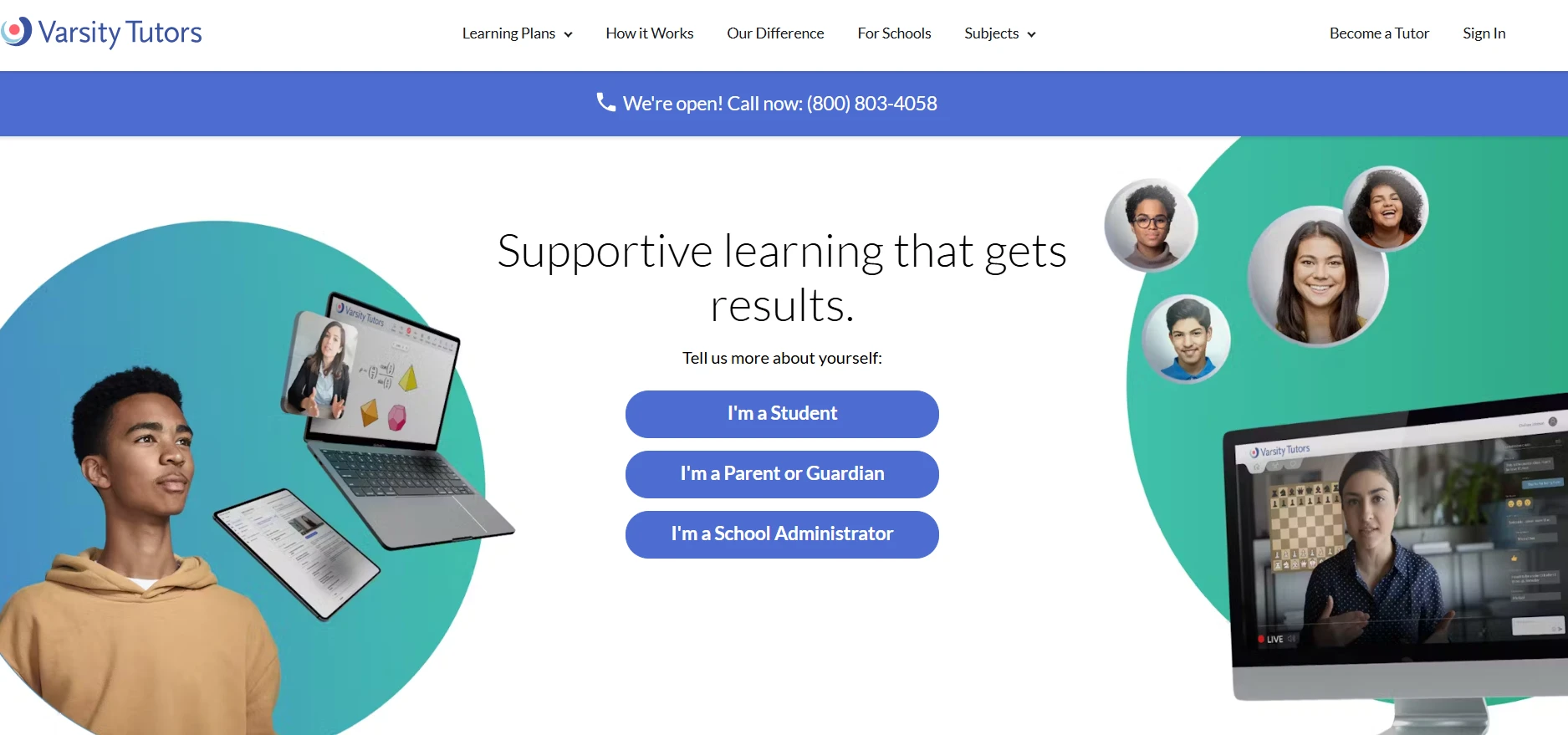
Pros over GoPeer: Varsity Tutors (formerly UniversityTutor) is a major K-12 and college tutoring network. Like GoPeer, it offers live 1:1 online lessons, and also provides group classes and test-prep courses. It has tutors for a wide range of grades and some professional certifications. Varsity Tutors often recruits highly qualified tutors and provides guarantees like “on-demand help” (some users say you can book lessons quickly with no minimum). Its scheduling and matching service is well-developed. Also, because it’s large, Varsity Tutors often has many tutors ready, so finding one in your subject can be easier than on smaller platforms. Cons compared to GoPeer: Varsity Tutors is generally more expensive. Its tutoring rate ranges roughly $50–$100/hr, depending on subject. There is no low-cost trial; you pay full price from the start. Quality is usually high, but it’s not flat-rate – more advanced tutors cost more. Varsity Tutors’ focus is broad, but it doesn’t emphasize Ivy students, and you can’t target college students specifically. There’s also no one consistent flat fee or unlimited plan. In summary, Varsity Tutors is great for guaranteed availability and high expertise, but it comes at a higher cost than GoPeer’s flat $25.
How GoPeer Works
A. For Students

Sign-up process: To begin, the parent or student goes to GoPeer’s website and clicks “Get Started”. You provide basic info (email, school grade, why you need help) using their simple form. GoPeer then asks which grade and subjects you need (elementary, middle, high school, etc.). This helps them suggest the best tutors. There is no fee to register. After submitting, GoPeer immediately recommends several vetted tutors based on your profile. You can browse tutor profiles (they highlight the tutor’s university and subjects) and pick one that fits your needs. Once you find a tutor you like, you can send them a message or request a session through the GoPeer platform. The tutor (or GoPeer matching team) may suggest a time to meet. You do not need to contact tutors outside the site. GoPeer shows you up to 150+ subjects and highlights tutors from top colleges for each. GoPeer also offers up to 10 free intro sessions with different tutors (each 30 minutes) so you can find a good match. This allows you to talk to a few tutors at low cost before committing. When scheduling, you select a date and time in GoPeer’s calendar. GoPeer handles the lesson logistics. Sessions happen live on GoPeer’s secure online classroom. You join by clicking a link (no downloads needed). The lesson is face-to-face video with a whiteboard, screen sharing, and chat tools. If needed, you can reschedule or cancel (with 12+ hrs notice) directly in the student dashboard. GoPeer charges the fee after each session. All classes are recorded so students can review later. In summary: students sign up online, get tutor recommendations, book lessons on the site, and meet the tutor in GoPeer’s virtual classroom.
B. For Tutors

Becoming a GoPeer tutor: GoPeer hires only current college students. Prospective tutors go to GoPeer’s site and click “Become a Tutor”. They must upload a college ID and fill out subjects they can teach. There is no application fee. After submitting the profile, tutors are vetted. Review takes about 72 hours. If accepted, tutors set up a profile showing their university, major, and tutoring subjects. GoPeer provides guidance on how to use the platform. Tutors keep 100% of what students pay. (GoPeer’s rate is fixed, so tutors effectively earn $20/hr in older listings). GoPeer does not charge any commission. There is no minimum hours requirement – tutors can pick up lessons at any time. According to GoPeer’s blog, work is fully online, flexible schedule, and you earn when students book you. Once approved, a tutor waits for students to contact them. Tutors use GoPeer’s messaging to communicate with parents/students. Lessons are taught in the GoPeer classroom with all tools provided. Tutoring earnings are paid out via Stripe to the tutor’s bank account, usually within 1–3 days of each lesson. The tutor portal also shows upcoming lessons, history, and earnings.
FAQs
Can tutors set up their own fee or is it fixed by the company? GoPeer’s tutoring rate is fixed by the company. Students pay a set rate ($25/hr) and tutors receive that full amount. Tutors cannot charge more or less; there is no bidding or negotiation. This is different from some marketplaces where tutors set prices.
How much can a GoPeer tutor earn hourly? As of now, GoPeer tutors earn $20–$25 per hour (depending on which promotional rate the company runs). All tutors are paid the same flat rate per hour, regardless of subject or experience. (The official rate has been $20/hr in past postings, but the student rate is listed $25 on site.) There are no bonuses for advanced subjects, so hourly earnings are capped at that flat rate.
How many hours of work can a tutor get per month? It varies. Many tutors find it challenging to get high hours at first. Reviews indicate that new tutors may see only a few lessons per month initially. One tutor noted being active for months before earning consistently. However, some dedicated tutors eventually fill their schedules as they build reputation. There is no guaranteed number of hours per month – it depends on demand in your subjects and how actively you engage with students.
Is it easy to get students on GoPeer? Most tutors say it is not very easy initially. Indeed reviews commonly mention that demand is low. New tutors often must wait weeks for responses. Some tutors say persistence pays off, but many find students hard to come by on GoPeer. This is partly because GoPeer’s user base, while growing, is smaller than some other platforms. For comparison, a large platform like Wyzant has far more students browsing tutors.
Tips for tutors to get more students on GoPeer: Tutor reviewers suggest keeping a complete and appealing profile. Be responsive: answer inquiries quickly. Try to fill out your profile with multiple subjects, especially in high-demand areas (math, science, writing). GoPeer also offers free intro sessions – use them to demonstrate value to students. Finally, reach out to students who post requests or join GoPeer’s tutor community. Patience is key: one review noted that if you stick with it, eventually you “have more clients than time”.
What do tutors like about GoPeer? Tutors appreciate the flexible scheduling and professional platform. According to tutor reviews, GoPeer allows you to be selective with hours (no quotas). Many mention that management is supportive and communication is prompt. The fact that tutors keep 100% of earnings is also liked. One tutor said it offers an “energizing” job with clear purpose. Reviewers also note the secure payment system and useful teaching tools as positives.
What do tutors not like about GoPeer? The main negatives are limited student demand and low pay. Many say there just aren’t enough lessons available, so tutors struggle to earn much. The fixed $20–25/hr rate feels low for college graduates, especially if tutors want higher pay for advanced topics. Some also mention technical glitches or UI issues (one review called the interface “wonky”). Finally, a few complaints appear about support – a tutor on BBB said a rep was rude when she tried to cancel. Overall, tutors generally want more lesson opportunities and a smoother refund/subscription handling.
GoPeer: Company Information
Founding year and background: GoPeer was founded in 2017 by college students Ethan Binder, Zura Mestiashvili and Erik Laucks. They started it from their Lafayette College dorm room to make tutoring more affordable and accessible. Their vision was to connect top college students to K-12 learners online. The founders gained media attention (e.g. Lafayette College news) and in 2023 were featured in Forbes 30 Under 30 for their work.
Founder’s details:
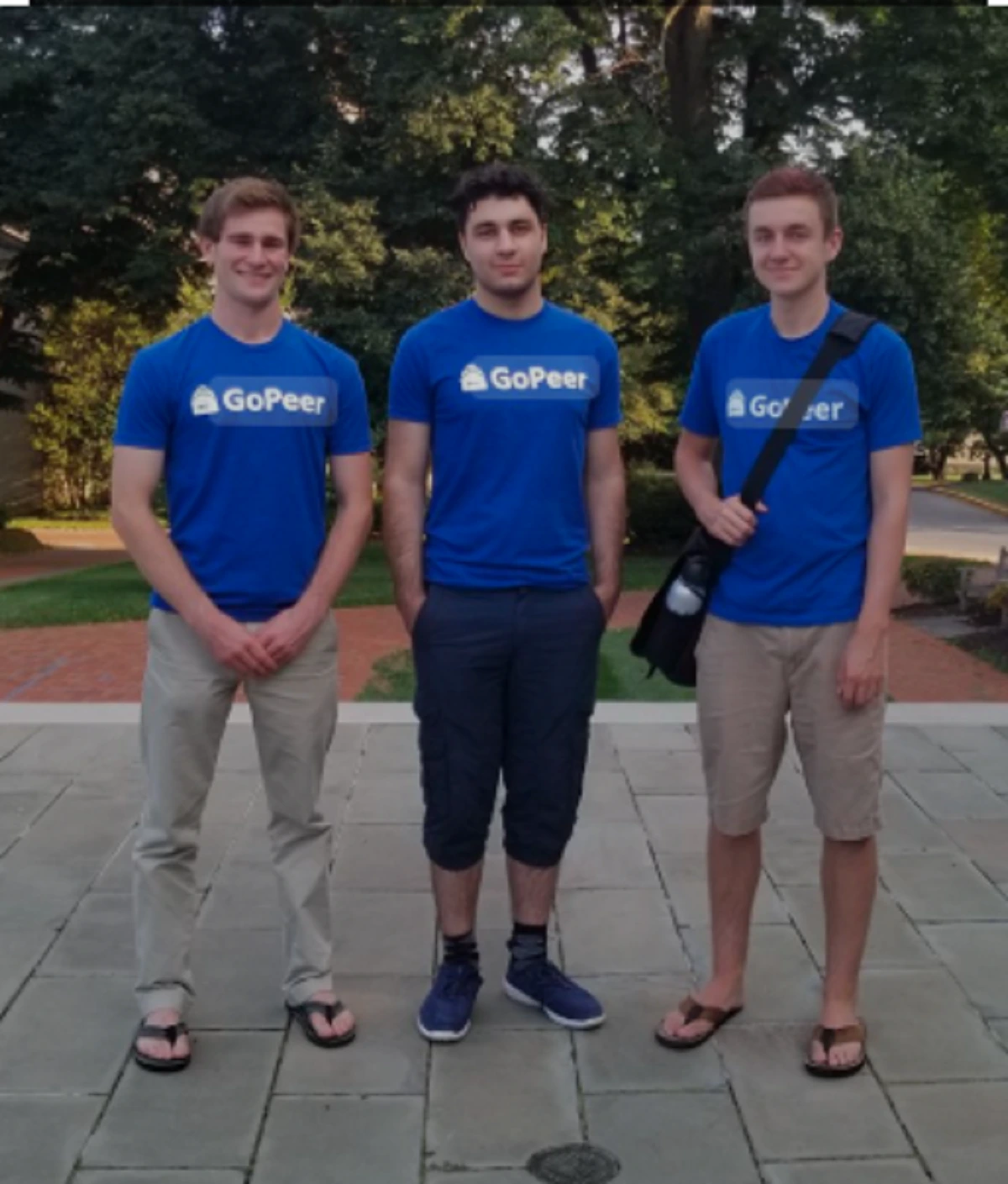
CEO Ethan Binder is a Lafayette College alumnus (Class of ’19). He served as CEO and actively leads the company. Along with him, Zura Mestiashvili and Erik Laucks co-founded GoPeer in 2017:contentReference[oaicite:116]{index=116}. The founders have educational credentials (Lafayette & Duke) and have been recognized for innovation in edtech. In interviews they emphasize improving tutoring quality and affordability.
Mission and vision: GoPeer’s mission is “to improve the quality and lower the cost of education”. Their stated vision is to make “high-quality tutoring accessible to all students”. These goals are referenced by the founders and on their website, framing GoPeer as an affordable tutoring solution for every family.
Scale of operation: As of 2020, GoPeer reported about 16,000 K-12 students and 10,000 college students on their platform. The business is headquartered in Providence, Rhode Island (US). It primarily serves US students, though their marketing says it reaches families “all over the world”. In the pandemic, they offered free tutoring globally, indicating some international reach. The service is mainly online, so technically anyone can join from anywhere. The number of full-time employees is small (BBB lists just one, presumably the CEO) – most work is done by remote tutors and a lean core team. Thousands of tutors (college students) and support staff deliver the service. In one report, GoPeer said a single 24-hour period saw 200,000 website visits, showing high interest.
Types of services: GoPeer focuses on personalized 1:1 tutoring. They do not offer essay writing or academic ghostwriting. Services include live online homework help, test prep sessions, and subject tutoring. Unlike some platforms, they do not sell essay-editing or bulk homework solutions. Their tutoring is live and interactive. They do have a structured “content and curriculum” toolset, meaning tutors can use GoPeer’s own lesson materials or students’ school materials during sessions.
Subjects offered: GoPeer advertises “150+ subjects”. Major subject areas include math (Algebra, Calculus, Trigonometry, etc.), sciences (Biology, Chemistry, Physics), English (reading, writing), and many K-12 courses. They also cover some AP and intro college courses like intro programming, high school statistics, and test prep (SAT, ACT). The tutor profiles show expertise in specific classes (AP Calc, Organic Chem, etc.). In short: virtually all K-12 school subjects.
Unique features: GoPeer’s selling points include a modern online classroom (video conferencing, whiteboard, code sharing, recorded sessions), and pre-vetted tutors from top colleges. They emphasize a flat pricing model and unlimited tutoring plan. The platform provides a mobile app (iOS/Android) for lessons on the go. Another feature is free trial sessions with multiple tutors, which helps users pick the right tutor. On the tutor side, GoPeer advertises that tutors keep all earnings and can work flexibly. GoPeer also offers tools for parents: linked accounts for families, progress tracking and metrics (though we found no third-party reviews on that).
USP of GoPeer
- Top-tier college tutors: GoPeer boasts tutors from universities like Harvard, MIT, and Berkeley. Most reviews acknowledge this – parents say the tutors are knowledgeable. However, since GoPeer charges a low flat fee ($25), in practice you might not always get the highest-ranked Ivy students. Those tend to teach elsewhere for more money. So while the advertising is true (GoPeer only hires ~5% of applicants from top schools), at this price point the average tutor may just be a solid undergrad or grad student.
- Flat affordable pricing: GoPeer advertises a $25/hr unlimited plan, far below typical tutoring rates. Students love this deal – on review sites the low price is often mentioned positively (for instance, Business Insider noted it’s just $25-35 vs $60+ normally). The monthly membership simplifies budgeting. However, some users report being surprised by auto-billing, which tarnishes the good value. Overall, GoPeer’s pricing model is a major draw (it’s repeatedly cited as 1/3 of the national average).
- Satisfaction Guarantee: The site boldly claims a “100% Satisfaction Guarantee”. This is a strong claim – in theory you could get lessons at no risk. But GoPeer’s own policy makes refunds almost impossible, so this guarantee seems mostly marketing. Some parents say GoPeer did not refund an unsatisfactory lesson (consistent with policy). In short, GoPeer *says* it will refund unhappy customers, but it won’t actually return fees. So this promise may not be fully fulfilled (a common complaint we found).
- Free trial and tutor matching: GoPeer’s free trial ($1 for 7 days) and up to 10 free intro sessions are real pluses. Many users note they could try multiple tutors risk-free. This feature is often missing from other sites. Reviews on Reddit and Trustpilot mention being happy with the trial promotion (similar to how Wyzant’s trial gets praise). So, unlike some competitors, GoPeer truly lets you sample its service with minimal cost.
Drawbacks of GoPeer
- Limited demand: As many tutors point out, there are often not enough students. If you need help in a niche or advanced subject, you may struggle to find a tutor on GoPeer (the tutors themselves report low demand).
- Fixed low pay: Every tutor earns the same hourly rate. This discourages highly specialized tutors or advanced subject experts. Reviewers say this cap means experts in, say, AP Physics will not earn more than anyone else, which can limit quality.
- Subscription issues: Despite the satisfaction guarantee, GoPeer’s refund policy is strict (no refunds on subscriptions). A parent complained about being charged year membership without consent. This creates trust issues. Basically, cancel carefully or risk fees.
- Focus on K-12: GoPeer does not cover college or grad-level coursework in depth. It’s mainly K-12, so families wanting calculus beyond high school or college engineering must look elsewhere.
- Platform quirks: Some users find the website interface a bit clunky. A tutor review called it “a little wonky”. Also, sessions require a stable internet and no significant tech support is mentioned if things glitch.
- Small company: With few staff in the US, GoPeer’s customer service and scaling may lag behind bigger players. Rapid growth can sometimes lead to hiccups in coordination and support.
Comparison with My Engineering Buddy (MEB)
GoPeer is designed for K-12 students at a fixed $25/hr, whereas MEB focuses on advanced STEM help for college/homework. MEB tutors often have engineering or technical backgrounds to match its target audience. In practice, MEB covers many college-level courses (mechanical, civil, electrical engineering, etc.) that go beyond GoPeer’s scope. On pricing, MEB’s rates are similar in headline (~$25/hr) but they also sell packages and project help. GoPeer’s strong suit is affordability and simplicity, while MEB’s is depth in engineering.
MEB user testimonials highlight its quality for hard subjects. For example, one student said MEB made tough physics problems “amazing” and easy to understand. Another noted MEB’s pricing is “fair and stress-free” with very helpful tutors. These reflect that MEB students feel confident even in complex topics like CAD and economics. In contrast, GoPeer’s reviews emphasize great K-12 support and low cost. Thus, if you need rigorous college coursework help, MEB may be better; for general K-12 tutoring at a low flat rate, GoPeer excels. Overall, MEB’s strengths are advanced STEM expertise and personalized attention, with customers reporting high satisfaction. GoPeer’s strength is its vetted college tutors and all-inclusive pricing, which appeals to budget-conscious families.
Customer Support and Policies
GoPeer offers online chat support on its site, but response times are unclear. Some tutors say support is “nice and supportive”. However, the refund policy is strict: no refunds on memberships despite the advertised guarantee. My Engineering Buddy emphasizes personal support and clear policies. On MEB’s site and Trustpilot, users mention responsive tutors and staff, suggesting better customer satisfaction. MEB’s stated satisfaction rate (97%) hints at strong customer service. In short, both services provide email/chat support, but MEB’s own reviews suggest more positive experiences with support and billing.
Global Reach and Localization
GoPeer primarily targets the US K-12 market and operates only in English. It does not promote any multilingual support. The platform is accessible worldwide (online), but all marketing and tutors are US-based. By contrast, My Engineering Buddy explicitly serves students in multiple regions (US, UK, Canada, Australia, Gulf countries). MEB likely has tutors who speak various English dialects for those regions. If non-English support or specific regional curricula are needed, neither platform claims specialization, but MEB’s global user base suggests somewhat broader reach. Overall, GoPeer is an English-only, US-centric service, while MEB advertises a wider international presence.
GoPeer’s future plans
GoPeer’s leaders have signaled growth through tech and data. In 2020 they raised $2M led by ex-Uber exec Ed Baker. The funding announcement said they would use it to “power product-driven growth” and focus on “analytics”. This suggests GoPeer plans to improve its platform (likely enhancing scheduling, analytics or maybe personalization). No official announcements mention AI. However, the industry trend is using AI to personalize tutoring, so GoPeer might explore AI tutoring assistants or lesson analytics down the road. Besides tech, the Forbes 30 Under 30 feature hints the company will try to expand its student base and marketing. We also expect more subjects or test-prep options. In summary: GoPeer intends to scale up and add data-driven features (possibly AI-based tools), but specific AI plans have not been published.
FAQs About GoPeer
How does GoPeer compare to My Engineering Buddy? GoPeer targets K-12 learning with flat pricing and college-student tutors. MEB focuses on engineering and STEM homework for older students. GoPeer’s lessons are strictly 1:1 live tutoring at $25/hr. MEB offers that too, plus help with projects, labs and papers (students note tutoring in CAD, physics, etc.). MEB has a 97% satisfaction rating, while GoPeer is praised for affordability. In short, GoPeer is great for younger learners and basic subjects, MEB for advanced, specialized topics.
What subjects does GoPeer teach? It covers standard K-12 subjects: math (algebra, calculus, geometry), sciences (biology, chemistry, physics), English (reading, writing), social studies, and test prep. The site says “150+ subjects”. If you need help with high school or middle school courses, GoPeer likely has it. It is not meant for college majors beyond introductory levels.
How do I cancel my GoPeer membership? You can cancel anytime using your online account. Simply go to Manage Billing and cancel before the next billing date. Note: GoPeer will not refund any remaining balance (no partial refunds). You must cancel at least a week before renewal to avoid the next charge. The site sends an email reminder before auto-renewal.
Who can become a GoPeer tutor? Only students currently enrolled in college are eligible. You’ll need to apply with proof of your college enrollment. High school or non-students cannot tutor on GoPeer. Accepted tutors are often from selective universities (only ~5% of applicants are accepted), so competition is high. If you’re a college student with good grades, you can apply on GoPeer’s tutor sign-up page.
How many students has GoPeer helped? According to their reports, over 16,000 K-12 students have used GoPeer by 2020. They also had about 10,000 college students signed up as tutors. These numbers indicate a fairly large user base for a young company. The figure will be higher by 2025, but those are the latest public stats.
Does GoPeer offer a satisfaction guarantee? GoPeer’s website says yes (a “100% satisfaction guarantee”). In practice, the guarantee is limited. The official refund policy states membership fees are non-refundable, so you usually cannot get money back if you don’t like the service. You should use the trial period to make sure you’re happy. (This is similar to some tutors’ complaints that the guarantee was not honored.)
How is GoPeer different from free resources? Unlike YouTube or textbook solutions, GoPeer provides live, one-on-one tutoring by real people. It’s not free (except the $1 trial). You pay for a scheduled session where a tutor explains things step by step in real time. This contrasts with sites like Khan Academy (free videos) or Q&A sites. GoPeer is more personalized, at a lower cost than most private tutors.
Is GoPeer available internationally? GoPeer’s platform is online and can technically be accessed anywhere. However, its marketing and content are focused on the US K-12 curriculum (up to 12th grade). There’s no localized content or multilingual support. Non-US customers would still use the US pricing ($) and likely US-based tutors. For now, GoPeer is best for English-speaking families in the US (and possibly Canada). For example, My Engineering Buddy explicitly lists many countries in its reach, whereas GoPeer does not.
Conclusion
GoPeer’s strengths are clear: vetted tutors from top colleges, a rich online classroom, and very affordable flat pricing. Students get unlimited access at just $25/hr, which is far below typical tutoring costs. The service is user-friendly and effective for K-12 learning. The weaknesses lie in its small scale and strict policies. Tutors often struggle to get students, and the promised “guarantee” is mostly marketing. In practice GoPeer works well but has room for improvement in matching and support. My Engineering Buddy is highlighted as a strong alternative for those needing advanced STEM help and personalized attention. MEB offers expertise in engineering subjects and an excellent satisfaction record. In summary, GoPeer is a solid choice for standard tutoring needs, while MEB is a great fallback when you need higher-level or specialized tutoring beyond GoPeer’s scope.
******************************
This article provides general educational guidance only. It is NOT official exam policy, professional academic advice, or guaranteed results. Always verify information with your school, official exam boards (College Board, Cambridge, IB), or qualified professionals before making decisions. Read Full Policies & Disclaimer , Contact Us To Report An Error

